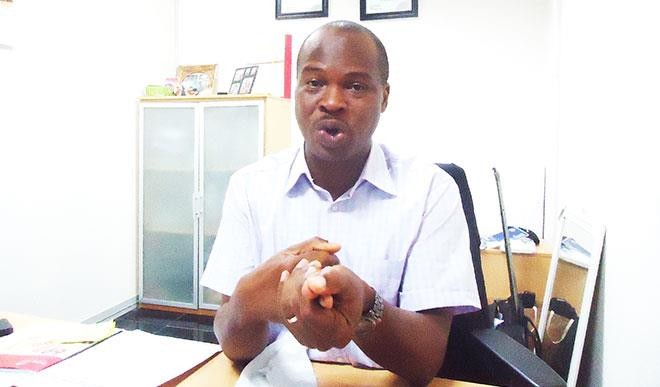GREEN REVOLUTION: Anchor Borrowers programme improves farmers’ access to finance – Expert
Dr Innocent Okuku is the Group Head of Commercial Services, Notore Chemical Industries Ltd. In this interview, he says that the Anchor Borrowers programme of the federal government, implemented by the Central Bank of Nigeria (CBN), which improves farmers’ access to finance, is better than the unsustainable agricultural subsidy. Excerpts: The government, through the […]


Dr Innocent Okuku is the Group Head of Commercial Services, Notore Chemical Industries Ltd. In this interview, he says that the Anchor Borrowers programme of the federal government, implemented by the Central Bank of Nigeria (CBN), which improves farmers’ access to finance, is better than the unsustainable agricultural subsidy. Excerpts:
The government, through the CBN, launched the Anchor Borrowers programme last year. What is it all about?
I understand that the Anchor Borrowers programme is an initiative championed by the CBN with the objective of supporting production and value addition of agricultural commodities putting pressure on our foreign exchange. For example, rice. Nigeria, imports an average of two million metric tonnes of rice and that puts pressure on foreign exchange to the tune of billions of dollars. Therefore, the CBN believes that if you do more of local production, there will be less pressure. The programme is structured in such a way that they find the Anchor Borrowers who are the people that need the produce of the farmers. The rice processing mills require the paddy harvested by farmers to operate. The rice processing mills have capacities they are not utilising because they are not getting enough paddies. So, those are the ones who are called the Anchor because they buy the farmers’ produce. When they identify the farmers who they will work with, the CBN then provides the finance for the farmers through a commercial bank to support all the production activities, but they don’t give the money in cash. The farmers working with the Anchor and the extension people jointly negotiate the amount and it will be channeled through a bank to carry out the farming activities. The farmers then grow the crop and the Anchor Borrower goes ahead to buy the paddy and pays the money into the account of the farmer in the bank, so that the bank can recover the money used for inputs and other items. So, the Anchor organises the farmers to produce what he or she requires. Because the Anchor does not have all the money to give to the farmers to produce, the CBN comes in to provide the finance. All the inputs are provided and the farmers are even trained to get the best output. In Kebbi State, 70,000 farmers are benefitting from the programme and the state government is also supporting the farmers in various areas. The farmer gets all he or she needs to produce and has ready access to market. When farmers have access to finance to produce and know they have ready market to make money, they will not be looking for subsidy. Subsidies are not sustainable. I believe that this is a programme we should focus on to overcome agricultural finance challenge in this country.
What is Notore’s role in the scheme?
In the Anchor Borrowers programme, Notore has been very active. We supplied all the urea required for the programme. We are also providing some extension support. Our extension people are there working with the state government to train the farmers on what to do. Those are the two major roles we play apart from attending stakeholder meetings and engaging in strategic discussions on the programme.
How has the scheme fared since inception?
It was launched in November last year. It has gone one cycle in the dry season. To be honest, the programme has done very well. The statistics show that the yields of farmers who were part of that programme in Kebbi were as high as 9 tonnes of rice per hectare. This is very interesting. We were somewhere around 3 tonnes per hectare before the advent of this programme. So, we are already seeing the light on how we can get out of the woods. The programme is good and the farmers are happy. I am not sure if you ask those farmers to go and queue for fertilisers now they will agree. They will prefer doing their farming in time rather than waiting for subsidy that will come when the rice cultivation season is gone. If you ask the processors, they will tell you they have doubled their access to rice paddy and they are happy, too. So, the programme is good and it should be expanded to cover other crops. What needs to be tracked is the repayment level so that the fund will be revolving.
How can agro finance for smallholder farmers take a cue from the Anchor Borrowers programme?
The programme is actually designed for smallholder farmers, because we are talking of one hectare. So, all smallholder farmers need to do, knowing that there is now a programme that allows them access to full finance to enable them produce, is to properly structure themselves. If you have an account in a bank, a BVN, an identity, show commitment to produce, and get linked to an Anchor. This is an opportunity for the smallholder farmers. The interest rate is reasonable-single digit, I think about 9%. I think this is the way to solve agricultural financing problem in Nigeria. If the money keeps coming back, the government will only be revolving the fund and more farmers will benefit.
Dear reader, do you have questions or enquiry regarding any farm problem or information about fertilizer?
Send us an E-mail to:
[email protected]
